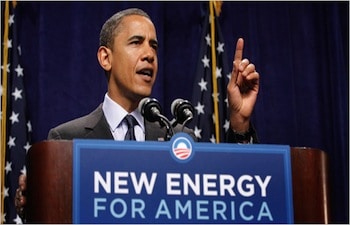Even the coal industry itself has conceded that there is no “war on coal”, but lawmakers in the coal-dependent state of Kentucky are still fighting this imaginary battle.
In the wake of President Obama’s speech earlier this summer where he discussed the need to reduce our dependence on coal and work on ways to control coal plant pollution, a bi-partisan group of lawmakers in Kentucky sent a letter to the president last week, warning him that his “war on coal” would be devastating to their state.
The 50 state legislators who signed onto the letter accuse the president of launching an “unfair attack on coal,” which the lawmakers argue will have a devastating effect on their state economy.
The bi-partisan group told the president that the coal industry is responsible for as much as $10 billion in “yearly” economic activity, although that number only represents the year 2010, and subsequent years have seen a sharp decline in the profitability of the industry’s operations in Kentucky.
While it is true that coal currently plays an important role in the Kentucky economy, using that as the sole reason to allow coal extraction to continue unfettered is a very poor plan. Currently, 22 counties in Kentucky have active coal mines, and together employ nearly 13,000 workers. The total number of workers is relatively small, but economically speaking, every job creates a ripple effect throughout the economy, boosting local businesses across the state.
But you can’t have a discussion on economics without considering things like opportunity cost and overall economic health. The lawmakers that sent the letter to Obama conveniently omitted these facts, as they completely destroy their case that coal is necessary for Kentucky.
In a nutshell, the coal industry is a net negative for the state of Kentucky. When considering only the direct costs that the coal mining industry encounters, which includes research and development, training, and repairing the infrastructure that is destroyed or degraded during coal mining and moving, the industry is in the red.
But the true cost of coal for Kentucky is more than what the industry spends or puts back into the economy. The residents who aren’t involved in the industry in any way are paying a very large price.
Coal mining and coal dumping sites are riddled with both poverty and exceedingly higher than average rates of cancer. Both of these external costs are shifted onto the taxpayers and federal government, who will ultimately have to pay for assistance and healthcare for those affected by the industry’s activities.
And it gets even worse. Kentucky, as a direct result of the coal industry, is home to Congressional districts that rank last in the country in life expectancy, general well-being, and emotional and physical health. For obvious reasons, the lawmakers didn’t include those little facts in their letter to the president.
As if that’s not enough, the state ranks fourth in the country for toxic power plant emissions, and is second in the nation for the release of arsenic, a cancer-causing heavy metal releasesd into the environment from power plants and mountaintop removal mining.
If jobs are the only concern of the lawmakers, then shifting the state to clean, renewable energy would create more jobs than the coal industry currently provides for the state. But if they are simply trying to preserve the campaign cash that flows freely from the industry, then they are right on point.
Subscribe to our newsletter
Stay up to date with DeSmog news and alerts







